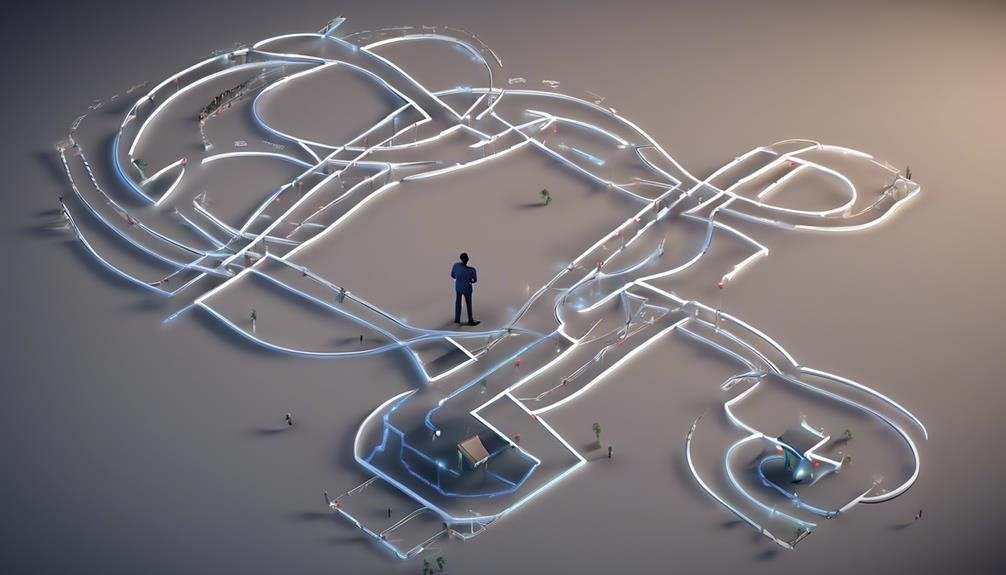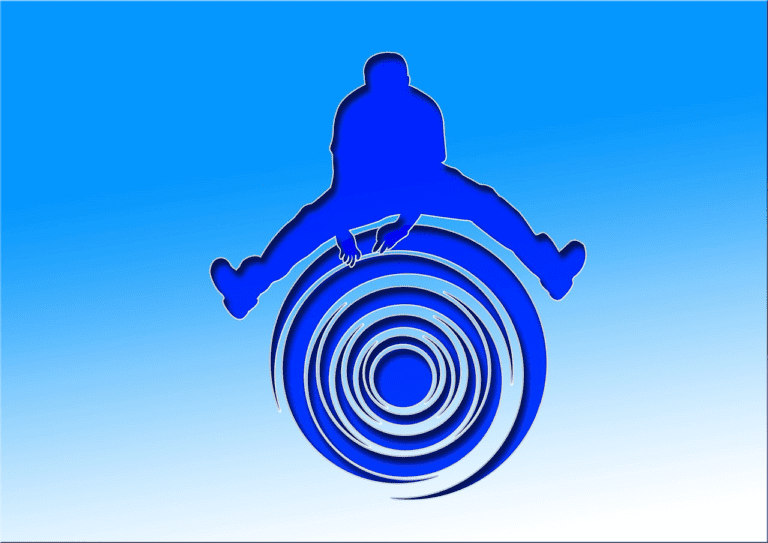Creating a Personal Development Plan for Career Transition
Embarking on a career transition can be both exciting and daunting. The process of creating a personal development plan to facilitate this transition involves a deliberate and strategic approach. It requires a deep understanding of one’s current position, a clear vision of future career goals, and a systematic assessment of skills and strengths.
However, the journey towards a successful transition doesn’t end there. It involves a series of crucial steps that are essential for laying a strong foundation for a fulfilling career change. These steps are not only practical but also provide a sense of direction and purpose.
Key Takeaways
- Assess your strengths and areas for improvement to gain clarity on your professional standing and make informed decisions.
- Conduct thorough research on potential opportunities, industries, and company cultures to align your skills and experiences.
- Develop a well-structured career plan with measurable milestones to track your progress and adjust as needed.
- Build a support network through mentors, professional groups, and career counseling services to provide guidance, support, and accountability during your career transition.
Understanding Your Current Position
To effectively navigate a career transition, it is essential to comprehensively understand your current professional position, including your skills, experience, and aspirations. Assessing strengths is a crucial starting point. Identify the skills and experiences that have contributed to your success thus far. This self-reflection can reveal core competencies that can be leveraged in your new career path.
Furthermore, identifying weaknesses is equally important. Recognizing areas that need improvement allows for targeted skill development and the formulation of a plan to address these gaps.
This process can be both empowering and enlightening. It provides a clear picture of where you stand professionally, enabling you to make informed decisions about the direction you want to take. It’s essential to approach this assessment with self-compassion and a growth mindset. Understanding your current position isn’t about self-criticism, but rather about gaining clarity and insight.
Embrace this as an opportunity to set goals, build on strengths, and transform weaknesses into opportunities for growth. This understanding will serve as the foundation for creating a robust personal development plan as you navigate your career transition.
Identifying Your Career Goals
As you move forward in your career transition, it’s important to clearly identify your career goals.
Setting achievable targets and having clear career objectives will guide your actions and decisions.
Clear Career Objectives
Developing clear career objectives is essential for identifying your career goals and creating a roadmap for your professional growth and success. It involves a process of self-reflection, self-assessment, and career exploration, which leads to self-awareness and confidence in career planning. Clear career objectives provide a sense of direction and purpose, essential for career readiness and advancement. To help you in this process, here’s a guide to assist you in creating your career objectives:
| Short-Term Objectives | Medium-Term Objectives | Long-Term Objectives |
|---|---|---|
| Acquire a new skill | Lead a project | Attain a leadership role |
| Complete a certification | Expand professional network | Establish a business |
| Gain industry experience | Pursue advanced education | Achieve executive position |
| Improve time management | Develop mentoring skills | Become an industry expert |
| Enhance communication | Obtain management role | Contribute to community |
Setting Achievable Targets
After establishing clear career objectives, the next step is to set achievable targets by identifying your career goals with a strategic and focused approach. Setting achievable targets is crucial for making progress in your career transition.
Here are three key strategies to help you identify and set achievable career goals:
- Goal Setting: Take the time to define your career goals clearly, ensuring they are specific, measurable, achievable, relevant, and time-bound (SMART).
- Motivation: Reflect on what truly motivates you and align your career goals with your passions and values to maintain enthusiasm and drive.
- Time Management, Prioritizing Tasks: Develop effective time management skills to allocate time for tasks that contribute to your career goals, ensuring that you prioritize activities that move you closer to achieving them.
Assessing Your Skills and Strengths
Understanding your own skills and strengths is a crucial step in developing a personal development plan for a successful career transition. Assessing your strengths and evaluating your skills is an essential aspect of personal development and self-assessment. It allows you to gain clarity on your capabilities and areas where you excel, which is fundamental for making informed decisions about your career transition.
When assessing your skills, consider both hard skills, such as technical expertise and knowledge, and soft skills, like communication, leadership, and adaptability. Reflect on your past experiences, projects, and roles to identify patterns of success and areas where you have demonstrated proficiency. Additionally, seeking feedback from mentors, colleagues, or previous supervisors can provide valuable insights into your strengths and skills from an outside perspective.
Furthermore, understanding your strengths can help you leverage them effectively in your new career path. This self-awareness will enable you to pursue opportunities that align with your strengths and develop strategies to address any skill gaps.
Embracing this self-assessment process with an open mind and a goal-oriented approach will empower you to create a personal development plan that maximizes your potential for a successful career transition.
Researching Potential Opportunities
As you explore potential opportunities, it’s essential to build upon the insights gained from assessing your skills and strengths, allowing you to align with roles that capitalize on your abilities and contribute to a successful career trajectory. Here are three key steps to consider as you research potential opportunities:
- Networking Opportunities and Job Market Research: Engage in networking events, connect with professionals in your desired industry, and leverage social media platforms like LinkedIn to expand your network. Additionally, conduct thorough research on the current job market trends to identify sectors with high demand for your skill set.
- Exploring Industries and Company Culture Research: Take the time to explore various industries and assess how your skills and experience align with their requirements. Researching company cultures and values is equally important to ensure that the organization’s ethos resonates with your own values and work ethic.
- Professional Development and Skill Enhancement: Identify areas for professional development and skill enhancement to remain competitive in the job market. Consider taking relevant courses, obtaining certifications, or acquiring new skills that are in demand within your target industry.
Setting Clear Objectives
As you embark on your career transition, it’s essential to set clear objectives that will guide your path forward.
Defining specific career goals will provide a clear direction for your efforts and help you stay focused.
Identifying the necessary skills and establishing measurable milestones will enable you to track your progress and make informed decisions along the way.
Define Specific Career Goals
Defining specific career goals is a crucial step in paving the way for a successful transition and ensuring a clear direction for your professional development. To achieve this, consider the following:
- Self-Reflection: Engage in a thorough career assessment and goal setting. Reflect on your strengths, weaknesses, and passions to identify what truly drives and fulfills you in a professional capacity.
- Skill Evaluation: Undertake a comprehensive evaluation of your skills and competencies. This will provide a clear understanding of where you stand currently and what areas need further development to align with your career aspirations.
- Strategic Career Planning: Develop a well-structured career plan that outlines your short-term and long-term goals. This will serve as a roadmap guiding your actions and decisions, fostering a sense of purpose and direction in your career transition journey.
Identify Necessary Skills
After establishing your specific career goals, the next step is to identify the necessary skills by setting clear objectives that align with your professional aspirations and development plan.
Begin by conducting a thorough skill assessment to evaluate your current strengths and areas for improvement. Consider the skills required for your desired career transition and compare them with your existing skill set. This assessment will help you to identify any skill gaps that need to be addressed.
Once you have identified the necessary skills, prioritize them based on their relevance to your career goals. Develop a structured plan for skill development, including specific milestones and timelines. Seek out relevant training, workshops, or mentorship opportunities to enhance your skills.
Establish Measurable Milestones
To effectively chart your progress in skill development, it is essential to establish measurable milestones that align with your career transition goals and provide clear objectives for your professional advancement. By doing so, you can effectively track your growth and ensure that you are making tangible progress towards your desired outcomes.
Here are three key steps to help you in establishing measurable milestones and tracking your progress:
- Define Clear Objectives: Clearly outline the specific skills or competencies you aim to develop and the timeline for achieving them.
- Set Quantifiable Benchmarks: Break down your objectives into smaller, measurable targets that allow you to track your progress effectively.
- Regularly Evaluate and Adjust: Continuously assess your development against the established milestones and make any necessary adjustments to your plan to ensure goal attainment.
Developing a Learning and Development Strategy
Crafting an effective learning and development strategy is pivotal in ensuring a smooth and successful career transition. Developing strategies to enhance one’s skills and knowledge base is essential for staying competitive in the job market and adapting to new professional environments. When creating a learning and development strategy, it’s crucial to identify learning opportunities that align with career goals and aspirations. This can include formal education such as courses or certifications, informal learning through networking and mentorship, and on-the-job experiential learning. The following table provides a visual representation of key elements to consider when developing a learning and development strategy:
| Learning and Development Strategy | ||
|---|---|---|
| Identify Learning Goals | Explore Various Learning Opportunities | Allocate Time and Resources |
| Define specific skills and knowledge to acquire | Research courses, workshops, mentorship programs | Set aside dedicated time for learning activities |
Building a Support Network
Navigating a career transition can be daunting, but having a strong support network can make all the difference. Seek out mentors who can offer guidance and insights, join professional groups to expand your network, and utilize career counseling services to gain valuable advice and support.
Building a support network is an essential step in your personal development plan as you navigate this career transition.
Seek Mentors
Developing a strong support network of mentors is crucial for navigating the challenges of a career transition and gaining valuable insights and guidance. However, finding suitable mentors can be a daunting task, and there are both benefits and drawbacks to mentorship.
To make the most of mentorship during a career transition, consider the following:
- Emotional Support: Having a mentor provides emotional support, helping you navigate the ups and downs of the transition with someone who understands and has been through similar experiences.
- Professional Guidance: A mentor can offer valuable career advice, share industry insights, and help you identify potential opportunities that align with your goals.
- Accountability: Your mentors can hold you accountable, helping you stay on track with your career transition goals and providing constructive feedback when needed.
Join Professional Groups
To strengthen your support network and gain valuable insights, consider joining professional groups relevant to your industry or career goals. Networking strategies and professional connections are crucial for career transitions. Industry events provide excellent networking opportunities where you can meet like-minded professionals, potential employers, and mentors. By participating in these professional groups, you can gain access to valuable resources, industry trends, and job opportunities. Additionally, the support and guidance from experienced professionals can be instrumental in your career development. Here’s a table showcasing the potential benefits of joining professional groups:
| Benefits of Joining Professional Groups |
|---|
| Access to industry trends and insights |
| Networking opportunities with professionals in the field |
| Potential job opportunities and referrals |
| Mentorship and support for career development |
Utilize Career Counseling
For individuals navigating a career transition, utilizing career counseling can provide invaluable support and guidance in building a strong and effective support network.
Career counselors offer a range of services designed to assist individuals in their career exploration and self-assessment. They can help you identify your strengths, weaknesses, and interests, allowing you to make informed decisions about your career path.
Additionally, career counselors can provide valuable insights into the job market and assist with industry research, helping you stay informed about potential opportunities and trends in your desired field.
Moreover, they can offer practical advice on resume building, interview preparation, and networking strategies, equipping you with the tools needed to navigate the job market successfully.
Embracing career counseling can provide the encouragement and direction necessary to thrive in your career transition journey.
Implementing Action Plans
Creating and executing action plans is a critical step in achieving our career transition goals. One essential aspect of implementing action plans is effective time management. It’s important to allocate specific time slots for tasks related to our career transition, such as updating our resume, networking, and learning new skills. By managing our time efficiently, we can make steady progress towards our objectives without feeling overwhelmed.
Additionally, having accountability partners can significantly impact the implementation of our action plans. Accountability partners provide support, motivation, and constructive feedback, helping us stay on track and committed to our goals. Regular check-ins with our partners can serve as a source of encouragement and can help us navigate any challenges that arise during the career transition process.
Incorporating these strategies into our action plans can enhance our productivity and keep us focused on the tasks at hand. By effectively managing our time and having supportive accountability partners, we can make meaningful strides toward achieving our career transition objectives.
Tracking Progress and Adjusting
As we progress in our career transition journey, it is crucial to track our progress and make necessary adjustments to ensure we are on the right path towards our goals. This stage requires adaptability and flexibility in planning, as well as a commitment to progress tracking and reflection.
Here are three key points to consider as you track your progress and make adjustments:
- Regular Reflection: Take time to reflect on your journey. Celebrate your achievements, no matter how small, and acknowledge the challenges you’ve faced. This reflection will provide valuable insights into what is working and what may need adjustment in your career transition plan.
- Adaptability: Embrace the need for adaptability in your career transition plan. Circumstances may change, and new opportunities or challenges may arise. Being adaptable and open to change will allow you to pivot when necessary and seize new opportunities as they present themselves.
- Flexible Planning: While it’s essential to have a structured plan, it’s equally important to be open to adjusting it as needed. Flexibility in your planning will help you navigate unexpected changes and stay focused on your ultimate career transition goals.
Celebrating Milestones and Successes
During the course of our career development, it’s essential to take time to acknowledge and celebrate the milestones and successes we achieve, as this not only provides motivation but also offers valuable insights into our progress. Recognizing achievements, no matter how small, is crucial for staying motivated and focused on our personal development plan. It’s important to celebrate these wins as they contribute to our overall career transition journey.
| Milestone | Success | Celebration |
|---|---|---|
| Completed a certification course | Secured a new job interview | Treat yourself to a nice dinner |
| Received positive feedback at work | Achieved a personal goal | Take a day off to relax and recharge |
| Networked with industry professionals | Overcame a challenging task | Plan a small gathering with friends |
| Published an article in a journal | Received a promotion | Buy something special for yourself |
| Completed a challenging project | Received recognition from a mentor | Celebrate with a weekend getaway |
Celebrating milestones and successes not only boosts our confidence but also serves as a reminder of our capabilities, keeping us motivated and focused on the path to career transition.
Conclusion
In conclusion, creating a personal development plan for career transition involves:
- Understanding your current position
- Identifying career goals
- Assessing skills and strengths
- Researching potential opportunities
- Setting clear objectives
- Building a support network
- Implementing action plans
- Tracking progress
- Celebrating milestones and successes
By following these steps, individuals can navigate their career transition with confidence and purpose, ultimately achieving their desired professional growth and success.







